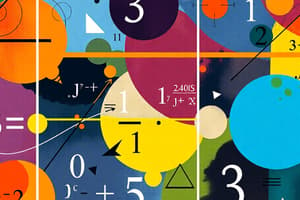Podcast
Questions and Answers
What is the primary focus of arithmetic in mathematics?
What is the primary focus of arithmetic in mathematics?
- Studying numbers and their properties (correct)
- Analyzing change through derivatives
- Manipulating symbols to solve equations
- Studying shapes and spatial relationships
Which branch of mathematics is primarily concerned with change?
Which branch of mathematics is primarily concerned with change?
- Calculus (correct)
- Algebra
- Geometry
- Trigonometry
Which of the following best describes a function?
Which of the following best describes a function?
- A visual representation of mathematical expressions
- A step-by-step procedure for solving problems
- A relation between inputs and outputs based on a specific rule (correct)
- A collection of numbers with specific properties
What operation does multiplication represent?
What operation does multiplication represent?
What does a mathematical proof demonstrate?
What does a mathematical proof demonstrate?
Which of the following statements describes inequalities?
Which of the following statements describes inequalities?
In which mathematical branch would you study trigonometric functions?
In which mathematical branch would you study trigonometric functions?
How do graphs assist in mathematical analysis?
How do graphs assist in mathematical analysis?
Flashcards
Mathematics
Mathematics
A field of study using logical reasoning, abstract structures, and quantitative relationships to understand numbers, quantities, and change.
Arithmetic
Arithmetic
The branch of math dealing with numbers and basic operations like addition, subtraction, multiplication, and division.
Algebra
Algebra
The branch of math that uses symbols to represent numbers and study relationships between them.
Geometry
Geometry
Signup and view all the flashcards
Calculus
Calculus
Signup and view all the flashcards
Functions
Functions
Signup and view all the flashcards
Equations
Equations
Signup and view all the flashcards
Sets
Sets
Signup and view all the flashcards
Study Notes
Introduction to Mathematics
- Mathematics is a fundamental field of study encompassing logical reasoning, abstract structures, and quantitative relationships.
- It deals with concepts such as numbers, quantities, structures, spaces, and change.
- Mathematics plays a crucial role in various disciplines, including science, engineering, computer science, and economics.
Branches of Mathematics
- Arithmetic: The study of numbers and their properties, including operations such as addition, subtraction, multiplication, and division.
- Algebra: The study of symbols and the rules for manipulating them to solve equations and study relationships between variables.
- Geometry: The study of shapes, sizes, and spatial relationships.
- Calculus: The study of change, using concepts like limits, derivatives, and integrals. It has applications in optimization, motion analysis, and modelling.
- Trigonometry: The study of trigonometric functions, which relate angles and sides of triangles.
Fundamental Concepts
- Numbers: Integers, rational numbers, irrational numbers, real numbers are fundamental to mathematics with distinct properties and applications.
- Sets: A collection of well-defined objects, used to categorize and group objects in mathematical operations and logic expressions.
- Functions: A relation between a set of inputs and a set of possible outputs with a specific rule for mapping inputs to outputs.
- Logic: The study of valid reasoning and arguments, using concepts such as implication, conjunction, and disjunction.
Core Mathematical Operations
- Addition: Combining two or more numbers to get a sum.
- Subtraction: Finding the difference between two numbers.
- Multiplication: Repeated addition of a number.
- Division: Finding how many times one number is contained within another.
Mathematical Tools and Techniques
- Equations: Statements that show the equality of two expressions.
- Inequalities: Statements that show the relationship between expressions, such as greater than or less than.
- Graphs: Visual representations of mathematical relationships, providing insights into trends and patterns.
- Algorithms: Step-by-step procedures for solving mathematical problems.
- Proofs: Demonstrations of mathematical statements' validity.
Practical Applications
- Mathematics influences scientific discovery and innovation through modelling phenomena like planetary motion or material behaviour.
- It is vital for engineering applications like designing structures and calculating trajectories.
- Economics utilizes mathematical models to forecast and analyze market trends.
- Computer science relies on algorithms and data structures developed using mathematical concepts, making programming possible.
Studying That Suits You
Use AI to generate personalized quizzes and flashcards to suit your learning preferences.
Description
Explore the fundamental branches of mathematics, including arithmetic, algebra, geometry, calculus, and trigonometry. This quiz will test your knowledge on key concepts, properties, and applications across these essential areas of study. Perfect for students looking to solidify their understanding of mathematical principles.




